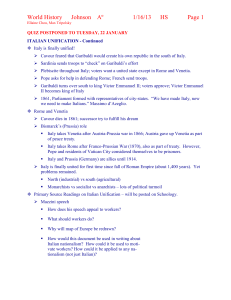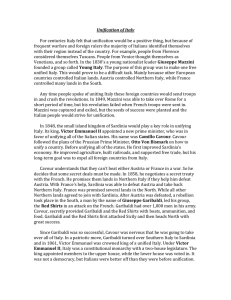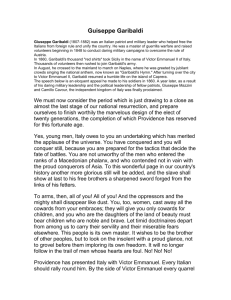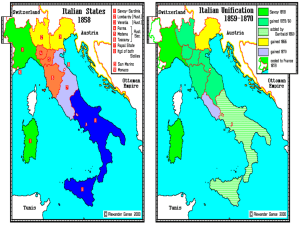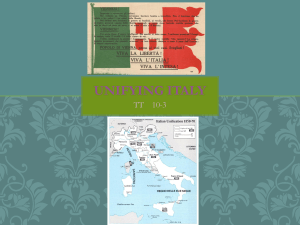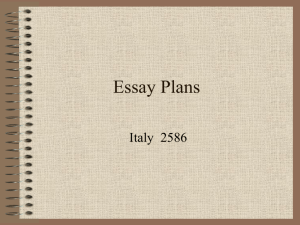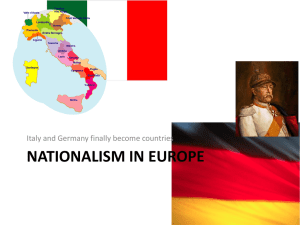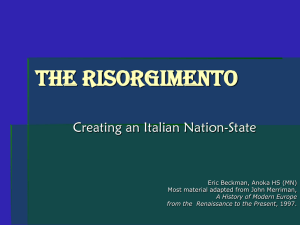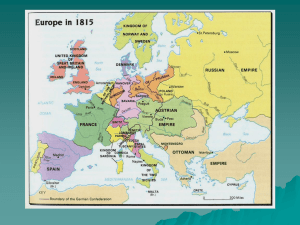The Unification of Italy and Germany
advertisement
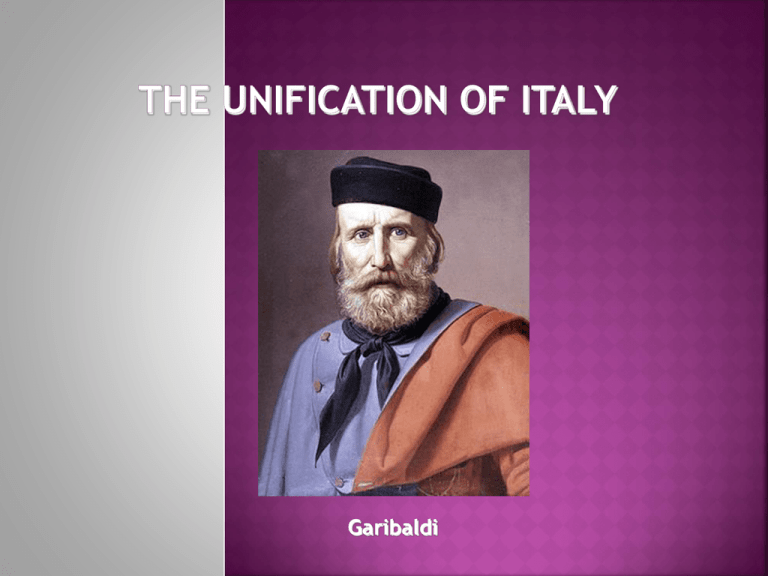
Garibaldi Nationalism is a feeling of belonging and loyalty that causes people to think of themselves as a nation. During the 19th and 20th centuries, nationalism was a powerful force throughout Europe. Nationalism was a force that connected all Italians. Geography: The River Po divided north and south and the Apennines Mountains divide east and west. Illiteracy – as most of the population could not read and write, nationalistic propaganda was difficult to spread. The Pope - felt a united Italy would reduce his rights in the Papal States. European powers such as France and Britain did not want a unified and strong Italy controlling the Mediterranean. Europe in the 19th Century: Geography • Italy is isolated • The Alps are to the North, surrounded by oceans. • Geographic isolation allows Italy to develop its own ways, customs. History • Italians are very proud of their heritage, including the Italian Renaissance. • Napoleon’s conquest of Italian states led to a desire not to be conquered again Italian unity. Efforts of Three Men: Mazzini, Garibaldi, Cavour He was a member of the Carbonari. The Carbonari were a secret group which used violence to obtain what it wanted. He formed Young Italy, made up of young people whose job it was to arouse enthusiasm for a united nation. Tried revolution but it failed. Count Camillo di Cavour was the “architect” (planner) of PiedmontSardinia’s revolt against Austria. This revolt encouraged other Italian states to revolt. Garibaldi first invaded Sicily, then urged them to join Piedmont-Sardinia under the leadership of Victor Emmanuel. Garibaldi handed over all conquered lands to Victor Emmanuel. 1852, Cavour became Prime Minister Worked toward rebuilding a thriving economy so that Italy could unify (as a monarchy) Cavour aligned Sardinia with France Sardinia supported France in war with Russia & gave them the provinces of Savoy & Nice In turn, France supported Sardinia in its war against Austria - (successful liberation) How did Cavour help Sardinia break free from the Austrian Empire? Talk with Partner 30 seconds Many Italians consider Cavour “brain” of Italian unification, Mazzini “heart” Giuseppe Garibaldi has been called “sword” of Italy Garibaldi joined Young Italy movement, 1833 Nationalist activities forced Garibaldi to flee Italy twice Learned techniques of guerilla warfare while living in South America Returned to Italy often to continue fight to free Italy from Austrian domination 1854, Garibaldi returned for good Cavour asked to lead part of Sardinian army in war against Austria After bitter fighting, Austrians agreed to give up Lombardy, retaining Venetia • Followers known as Red Shirts because of colorful uniforms • By July 1860, using guerilla warfare, Garibaldi, Red Shirts gained control of island of Sicily • September, Garibaldi, Sardinian troops conquered Naples • Red Shirts now controlled southern part Italian peninsula • Garibaldi wanted a republic, but ultimately offered the Kingdom of Two Sicilies to Sardinian king Victor Emmanuel What actions led Garibaldi to be called the “sword” of Italian unification? Talk with Partner 30 seconds • 1861, territories held elections, all agreed to unification • Holdouts were Venetia, still belonging to Austria; Papal States, under French troops supporting pope • 1866, Prussia defeated Austria, gave Venetia to Italy • 1870, Prussia forced French to withdraw from Rome • Italian troops entered Rome, completed unification under King Victor Emmanuel

